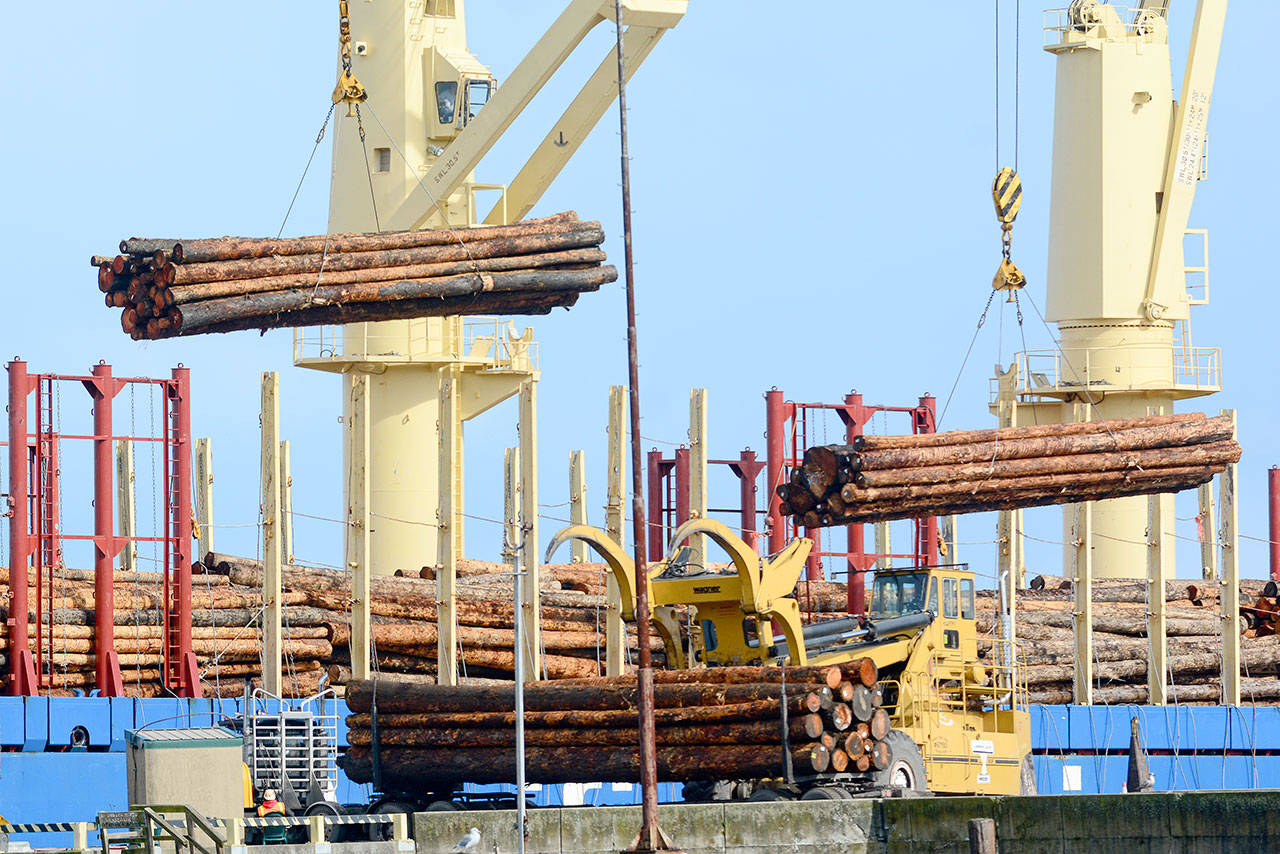PORT ANGELES — The Board of Natural Resources is considering five options for managing timber harvests, one of which is more than twice as good for Clallam County’s economy than the option that’s best for the state economy overall.
Olympus Consulting presented those projections to the Clallam County and Port of Port Angeles commissioners in a joint meeting Monday.
The Board of Natural Resources is considering setting a new sustainable harvest level for the 2015 to 2024 planning decade for forested state trust land in Western Washington.
Dan Underwood of Olympus Consulting said he was shocked that Alternative Two, which calls for harvesting 4,893 million board feet across the state, was 2.33 times better for Clallam County’s economy than Alternative One, which calls for harvesting 5,500 million board feet.
Under Alternative Two, up to 229 million board feet could be harvested in Clallam County, while 210 million board feet is offered in Alternative One.
The Port of Port Angeles and Clallam County commissioned Olympus Consulting to look at the economic impact of each of the alternatives — outlined in the draft Environmental Impact Statement for the proposal — in Clallam County.
The exact amount of money that would come to Clallam County in the form of wages, taxes and timber harvest revenue wasn’t yet available Monday, but the report will be released in full to the county and port this week.
Alternative Three was the second best option for the local economy. Alternative Two was roughly 1.2 times better than that in terms of economic impact, he said.
The presentation came just days before the comment period for the draft EIS ends. The comment period closes at 5 p.m. Thursday.
Clallam County Commissioner Bill Peach, who serves on the Board of Natural Resources, said the state board has discussed mixing and matching the alternatives.
“That is the question we’ll be working on,” he said. “This is the first time data has been presented at the county level.”
He said the state board is authorized to mix and match as long as the final decision fits in the scope of the EIS.
The firm estimated that Alternative 2 would provide 31 new jobs to Clallam County while Alternative One would only provide 7.6, Underwood said.
The possible economic impacts presented were based on the assumption the state Department of Natural Resource would sell all the timber proposed in the alternative.
Jason Cross with Olympus Consulting said that while the consulting firm has to assume harvest levels will be reached in each of the alternatives, commissioners do not.
“We have to assume they’re going to do what they wrote down,” he said.
Commissioners from the port and county expressed doubt that harvest amounts would reach the goals in the alternatives.
“Is there anyone in this room that thinks the assumptions in Alternative Two is realistic?,” Clallam County Commissioner Mark Ozias asked.
The port agreed to sign a letter to DNR to comment on both the EIS for sustainable harvest level and the long-term conservation strategy for the marbled murrelet.
The port is advocating the alternative with the most harvest volume and the most positive impact to rural Western Washington economies and employment levels.
Port Commissioner Steve Burke was not at the meeting.
Clallam County commissioners did not vote to sign the letter.
Ozias said he was not familiar enough with the topic to sign the letter and that it hadn’t been discussed in public yet.
“I will not be prepared to sign on a letter of this regard by [Thursday],” he said. “I have a lot of homework to do before I can even make an educated comment.”
Peach asked if the Ozias would agree to a sending a letter written in general terms.
Ozias said he would have to read such a letter first.
“Once it’s part of the public record it’s there for conversation and debate,” Peach said. “I’d hate to see the [county] commissioners be silent.”
While the county has not discussed the issue, the port has been discussing it at its Timber Advisory Committee for months, said port Commissioner Colleen McAleer.
The port wrote to the Board of Natural Resources in January, asking it to pick a sustainable harvest calculation that allows Clallam County to recover lost revenue from unsold timber over the past decade.
Harry Bell, chair of the Timber Advisory Committee, said it’s not a new issue and that commissioners should be prepared to take a position.
“Not to comment reflects terribly on you as county commissioners,” he said. “That does not bode well for you in such an important issue to our county.”
________
Reporter Jesse Major can be reached at 360-452-2345, ext. 56250, or at jmajor@peninsuladailynews.com.

